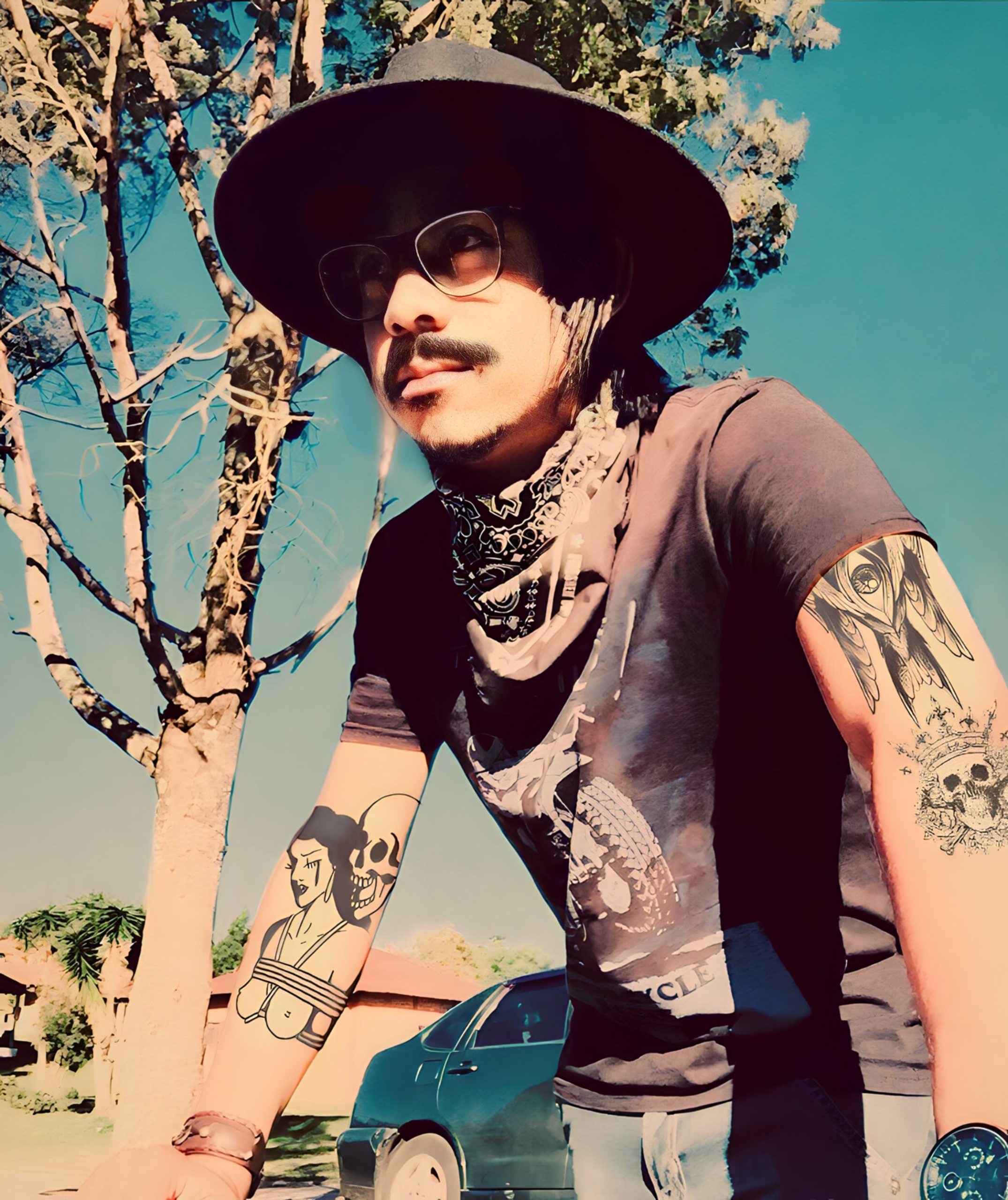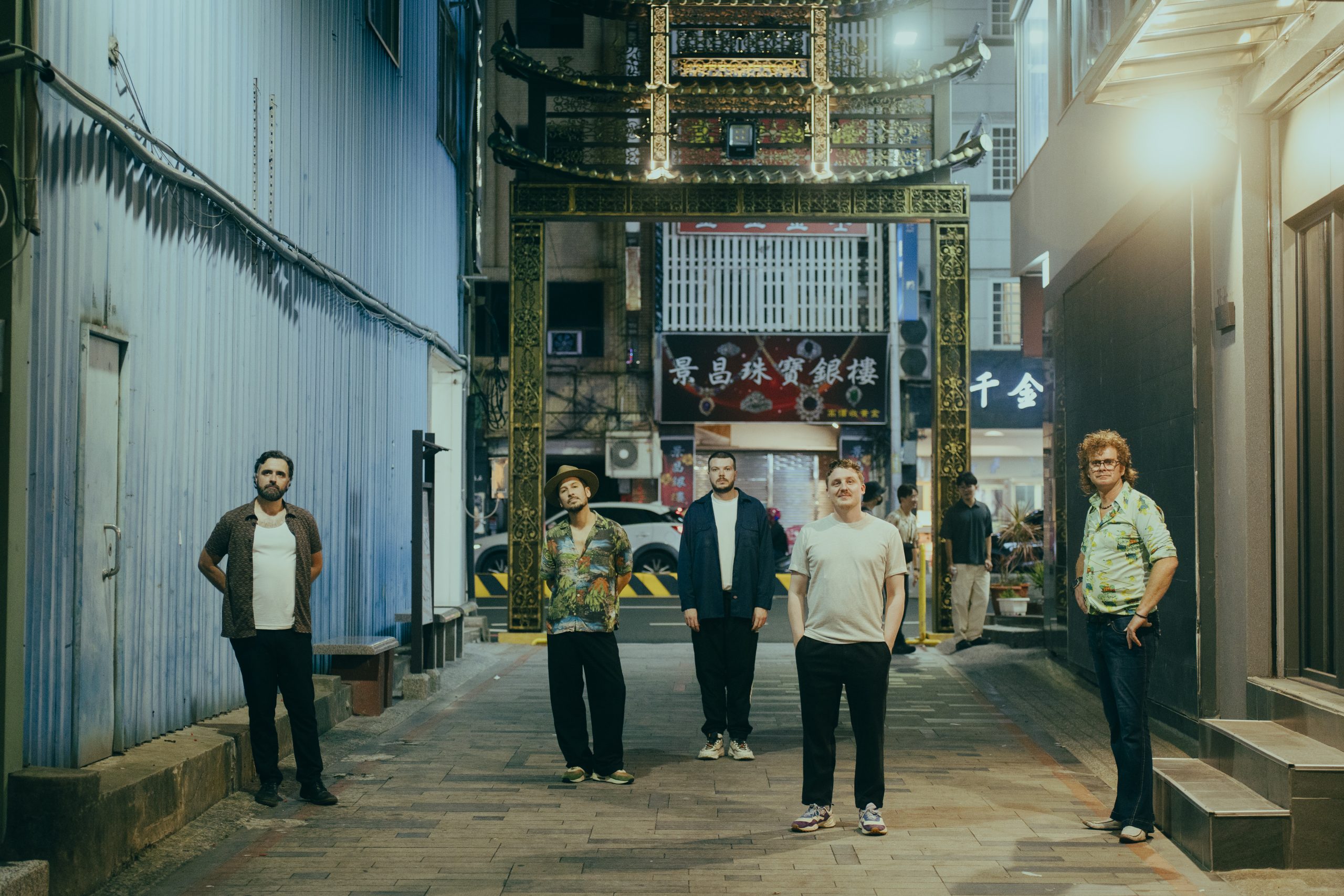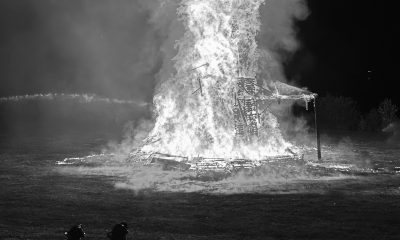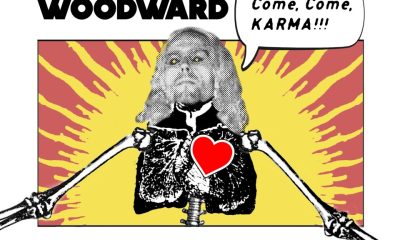Artist Spotlight
Saulo Oliveira S. as the Prince of Rock: a review on the iconic EP

Think of a name. He is a Rock and Roll royalty. Five letters. No, it’s not that one. Saulo, from the Hebrew “shā’ūl” means “the required” or “asked for”. Well, in a poetic reading, it is appropriate that this would be the name of the one required by Rock and Roll to be known as the Prince of Rock.
As a matter of fact, Saulo’s artistic excellence reaches maximum levels in all fields of his expressiveness and with his increasingly growing popularity, the model is bringing Rock and Roll closer to new generations with a reinvigorated look.
But what is it about him that could be said that hasn’t been said yet about Shawn Mendes, Justin Bieber or Billie Eilish, all personalities that came straight from the internet, either if it was YouTube or Soundcloud?
For instance, his larger-than-life beginnings.
Born on July 14, Birmingham, England and raised in Curitiba, Brazil, Saulo was just 12 years old when, on 6/6/6, waiting for the bus to school, at a crossroads, he received a visit that would mark his journey.
The boy was playing his harmonica in the company of classmates when a man, in a black suit and pale skin, approached and proposed a harmonica duel. Taking his harmonica from his pocket, the man introduced it as “Elder Harmonica” and swore that it would grant unlimited musical powers to its possessor, a harmonica made in the freshness of the flames of hell.
The challenge was simple, whoever played the best harmonica solo would be worthy of becoming the bearer of the instrument. If Saulo lost, he would have to sign the papers that the man promptly took out of his pocket and grant him his soul. The man played his solo and everybody applauded.
Oliveira played “Man With Harmonica” by Ennio Morricone, which got them all speechless. The man bowed and, putting the papers in his pocket, on his knees, he handed the Elder Harmonica into Saulo’s hands. The supposed devil lost more than a soul that day, he lost the harmonica and his place of respect in the Faustian logic.
Although Saulo tries to minimise everything by saying that “he was probably just another one of those crazy people from the neighbourhood who walk the streets without purpose, often begging, beyond food, also interaction”, the magnified view of his feat, narrated hours later by his friends on a page on the now defunct Orkut, it spread with infernal fervour.
The community “The Boy Who Defeated the Devil and Became Bigger than God” gained thousands of followers in hours and already passed the sixty thousand mark the following week when Saulo, as a good introvert, not knowing how to deal with popularity, began to miss important classes, running away from fame, from an early age, as the devil runs away from the cross.
But if Saulo operates under the mood “J.D. Salinger of Rock”, in the sense that he is a perfectionist author who disappears after each work, for his audience the consolation comes from the fact that, undoubtedly, the next project that the artist will release will satisfy all the hype of expectations, because – and this has already become commonplace-, Saulo Oliveira is synonymous with excellence.
Oliveira debuted in music by composing the soundtrack for the short film, documentary, which he also directed “Ethics, Politics and Citizenship”, in 2013. After that, he disappeared and only returned to entertainment in 2018 with experimental works released occasionally on his, at the time, newly created Soundcloud profile.
Then, in 2019, now under his independent label “British Rock Records”, he released six other singles (Johnny Ride, Old MTV, Kool Kids Klub, What Governs Behind Them, Like We Used to Do and Antichrist-Mas).
In 2020 he released the album “Wild Horizon” which already outlined a bold musical maturity, although Saulo’s modesty will not allow him to see this: “I was just experimenting, trying stuff, it was an uncompromising approach”. Also in 2020, he dropped the single “Lockdown”.
In between his artistic works, Saulo attended the Pontifical Catholic University of Paraná, which is where his law degree comes from and studied Beethoven’s 9th Symphony and the 19th Century Orchestra at Harvard Faculty of Arts and Sciences, holding a Harvard degree in Arts and Design.
Finally, in 2022, the rockstar dropped an EP worthy of five stars out of five, catapulting him into the pantheon of “one of the most creative minds of his generation”. The “Prince of Rock” guarantees its place in Rock and Roll history and establishes Saulo as one of the world’s greatest living songwriters.
From Oliveira’s storyteller veins, characters such as Riley, Kyle, Janet, James Johnson and the unnamed couple of “Cosmic Jive” are conceived to enrich his repertoire as a spectre of his inquisitive-nihilistic perspective. In other words, his first album has entertaining songs warped in layers of symbolism and metaphors, always culminating in a bitter outcome; the characters are thrown into pessimistic endings, a Saulo’s signature.
Now, with the new approach, by subverting his narrative signature, Saulo managed to bottle lightning.
As it is common for him to be inspired by the greats, when considering his new EP in the “Hip-Rock” format, he was inspired by Rage Against the Machine and Eminem. There could have not been a better choice.

In “Renewing Rock N Roll” – the EP’s flagship -, Saulo delivers his sentences at a frantic speed. Everything is built to hold attention. The rocker spells 1.593 words in six minutes while Eminem spelled 789 words in “Lose Yourself” and 1.539 words in “Rap God”, both 5 and 6 minutes respectively. Now, that’s history happening, a case of how palatably epic RRNR is.
The saga begins with Mackenzie McNeil, a fictional alter-ego for Saulo, who is oscillating between two paths. Therefore, when it is said that the quality of the EP showcases the composer’s elevated level of sophistication, it is because, now, Oliveira debugs his Chekhovian traits.
Mackenzie talks with a friend, Nickolas, and vents about the insecurities of his new projects, after all, he loves the seventh art and is also a music aficionado. He receives strong words of encouragement from Nicko who doesn’t expect his friend to give up any of his passions because of difficulties.
Once the chorus comes to fruition everything reaches a graceful upheaval point with Mack’s conviction that he has the potential to be whatever he wants to be. The speaker mentions the empiricist philosophy of John Locke reaching the summit of self-knowledge in this spasmodic roller coaster of feelings. Mack, just like Oliveira, was born as a blank slate (or a blank sheet because Saulo couldn’t step out of the rhyme) to be filled with the events of a life that sounds promising. As in the idea of “Tabula Rasa”, RRNR is about experience.
The song’s epilogue is preceded by twists and turns with descriptions of a dispute in the courtroom and a few name drops in an overwhelming rhythm. Saulo’s intimacy with words is so mesmerising that “knits” becomes “stink” when he goes back in his sentences and jaw-drops us all about what a wizard of words he is. The writing here is nothing short of colossal.
In the end (spoiler alert) you will discover that there was no Nickolas, it was only Mack, playing his improvisation to himself in the mirror which, then, invokes the stitching of the entire plot. Nicko is an alter ego for Mack and Mack is an alter ego for Saulo. Mack concludes that he is the prince, irrevocably, so a new stage in the artist’s career is sealed.
The voice of the friend who exhorted him was his inner voice. He notices, in the mirror, at the end, that Nicko’s reflection transmutes into his own, the outcome here evokes self-sufficiency, the awareness that it is not necessary to listen to anyone else’s voice, not even God’s.
The work speaks of the author himself. It is Oliveira’s self-sufficiency that leads him to always compose alone, record the vocals, play all the virtual instruments that will shape the melody he created, mix, master and do the post-production of all songs. He doesn’t need anyone, that’s his gift and his curse.
Through these eponymous layers, it’s rewarding to follow the progression of this hero’s journey. You may finish the song more encouraged, inspired and determined to conquer your space in life, to do the events that will fill your pages.
After that, of course, “That Liar Never Walked on the Water” emerges as the second act in which the protagonist assumes full irreverence in a “modern manifesto that will free you from idolatry”. Monolith’s architectural cadence, with drums, guitar and well-adjusted sound effects, projects the ambivalence of mystery and revelation onto the listener. In the final act, the rhythm is more smooth, yet the lyrics are intense. “Macneil” features “Elder Harmonica” and closes the EP, confirming the quality with which it all began.
As for Saulo, there is no doubt that the boy who started playing his harmonica at a crossroads and about whom, since then, numerous articles have been written, went on to write his personal story with remarkable acts. Understanding Oliveira means understanding the next pages of alternative rock. While denying his monarchic predestination Saulo quotes another writer, as good as him: “Uneasy lies the head that wears the crown”.
Artist Spotlight
Mamas Gun and Brian Jackson shines light on the truth on latest release “DIG!”

Mamas Gun makes a strong comeback with their new single “DIG!.” The track sounds more like a strong statement of intent than just a release. The UK band is known for its smooth blend of blue-eyed soul and traditional black music. They show once again that they can make music that sounds both thoughtful and very new, while still being real, emotional, and sophisticated.
“DIG!” was recorded directly onto analogue tape, and every note has warmth, grit, and soul. The production choice gives the music a rich, natural sound that complements the band’s unique groove. It is a piece of music that makes people slow down, really listen, and experience it rather than hear it.
Adding famous collaborator Brian Jackson, whose vocals, keyboard, and flute give the song a timeless elegance, adds even more depth and magic. Jackson is known for working with artists such as Stevie Wonder, Gil Scott-Heron, Roy Ayers, and Earth, Wind & Fire. His addition makes the song something truly special. His reunion with Andy Platts, the lead singer of Mamas Gun, almost twenty years after they first worked together creatively in New York, gives “DIG!” a very personal touch that can be felt throughout. “DIG!” sets a strong mood based on connection, art, and essence. Mamas Gun not only goes back to their roots but also makes them stronger. This song is heartfelt, timeless, and completely captivating.
Connect with Mamas Gun on Spotify || Instagram || facebook || Youtube
Artist Spotlight
Bromsen crafts a suspension between attachment and release in new single “Concendrain”

Bromsen’s latest release, “Concendrain,” is very immersive and lives in the space between control and disintegration. The song smoothly shifts from focused to tired, from connected to free, and captures a complex emotional balance that is both personal and universal.
“Concendrain” starts slowly and carefully, the structure has layers that change over time, so each part can come out on its own without any stress or hurry. As time goes on, electronic textures begin to emerge, giving the music a mood that eventually turns into rock-infused energy. These different sounds don’t clash, they work together to create a track that is alive, fluid, and always changing.
The guitar, voice, and rhythm should all work together on the song. These parts don’t compete for attention; instead, they work together to make a smooth flow that pulls the listener into the song’s emotional depth. The arrangement features vocals that complement complex guitar lines and a steady beat that keeps everything in line.
“Concendrain” is really interesting because it has two sides. The track is about the fight in your head between giving up and pushing through, and between staying focused and giving in to tiredness. Bromsen and Reatsch work together to make something that looks natural and well-made. “Concendrain” doesn’t try to be cool or follow trends. Instead, it gives you a slow experience that you should really pay attention to. “Concendrain” is a powerful and thought-provoking work that sticks with you long after the last note has faded away. It stands out because its structure changes, its atmosphere is rich, and its emotions are strong.
-

 Artist Spotlight5 days ago
Artist Spotlight5 days agoGOODTWIN shares reflection with indie-pop single, “Soak It Up”
-

 Artist Spotlight3 days ago
Artist Spotlight3 days agoSAMSARA transforms quiet heartbreak into a modern rock journey on latest release “mrs. porter”
-

 Artist Spotlight3 days ago
Artist Spotlight3 days agoTom Woodward exposes the dark side of modern idol worship in latest release “PHONEY MESSIAH”
-

 Artist Spotlight3 days ago
Artist Spotlight3 days agoMORPHEUS VON DOBENHAUSEN lets go of the chaos, dancing steady soft and slow in latest release “GOODBYE CHAOS”
-

 Artist Spotlight3 days ago
Artist Spotlight3 days agoSkillMusicsa speaks in silence when love fades with latest release “How Could You”
-

 Artist Spotlight3 days ago
Artist Spotlight3 days agoSavvie steps out with an anthem of power and perseverance on latest release “Incredible”
-

 Artist Spotlight3 days ago
Artist Spotlight3 days agoMarcello Cordova turns loss into light on latest release “Jan 3rd (I Wish We Would Have Had More Time)”
-

 Artist Spotlight24 hours ago
Artist Spotlight24 hours agoPaul Hodes and The Blue Buddha Band hit the open road with soulful americana in latest release “The Heartland”

